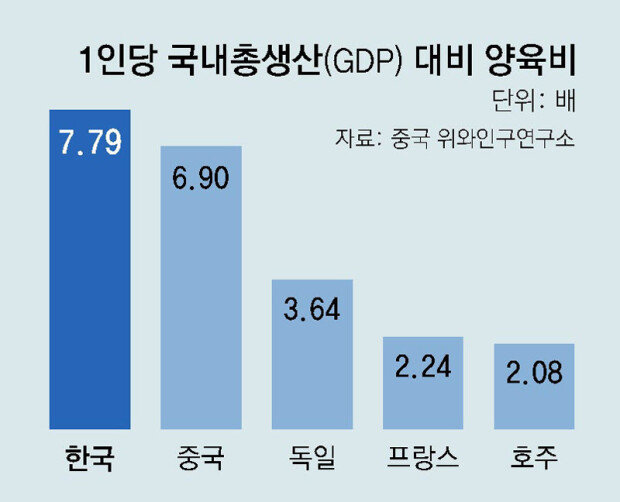Report: S. Korea is the most expensive country to raise children
Report: S. Korea is the most expensive country to raise children
Posted May. 02, 2023 08:03,
Updated May. 02, 2023 08:03

South Korea is the most expensive country to raise children in the world, followed by China in second place, according to a recent report by a Chinese research institute. The report indicates that the high cost of childcare in both countries has resulted in a reluctance among the younger generation to get married and have children, contributing to the world's lowest birth rates.
On Monday, the Beijing-based Wai Yin Population Research Institute's report was cited by the Hong Kong-based South China Morning Post (SCMP), estimating that raising a child in South Korea until the age of 18 costs 7.79 times the country's Gross Domestic Product (GDP) per capita, making it the most expensive in the world. China follows with a ratio of 6.9 times, making it the second-highest in the world. This is an amount two to three times higher than that of Germany (3.64 times), France (2.24 times), and Australia (2.08 times).
The research team estimated that raising a child in China until the age of 17 costs an average of 485,000 yuan (about 93.9 million won), and if the child goes to university, it costs 627,000 yuan (about 121.4 million won). However, there is a significant gap in the average childcare costs between urban and rural areas. The research estimated that in Beijing, the cost is 969,000 yuan (about 188 million won), and in Shanghai, it is 1,026,000 yuan (about 199 million won). According to China's National Bureau of Statistics, Chinese workers earned an average of 105,000 yuan (about 20.3 million won) per year in 2021.
The research institute highlighted that the high cost of childcare in South Korea and China is a significant obstacle to marriage and childbirth. They further suggested that there is a need for national policies to reduce childcare costs, including "cash and tax subsidies, housing purchase subsidies, parental leave based on gender equality, and flexible work schedules."
This research comes as China's population declined for the first time in 61 years last year, and the birth rate reached its lowest level in 73 years. The United Nations also reported earlier that India's population surpassed China's, with a population of about 1.425 billion people as of the end of last month.
chaewani@donga.com







